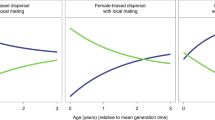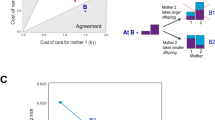Abstract
Models of how people make decisions are central to economic theory. But when cast in a darwinian framework, such models provide insights into animal social behaviour. This is especially true of family-based societies in which the profitability of pursuing different behaviours is strongly influenced by gender, kinship and social position within the group. The potential of this approach is shown by modelling the reproductive decisions facing individuals in a complex bird society, that of the white-fronted bee-eater.
This is a preview of subscription content, access via your institution
Access options
Subscribe to this journal
Receive 51 print issues and online access
$199.00 per year
only $3.90 per issue
Buy this article
- Purchase on Springer Link
- Instant access to full article PDF
Prices may be subject to local taxes which are calculated during checkout
Similar content being viewed by others
References
Pyke, G. H. A. Rev. Ecol. Syst. 15, 523–575 (1984).
Stephens, D. W. & Krebs, J. R. Foraging Theory: Princeton Monograph in Behavior and Ecology (Princeton Univ. Press, Princeton, 1986).
Schoener, T. W. in Foraging Behavior (eds Kamil, A. C., Krebs, J. R. & Pulliam, H. R.) 5–66 (Plenum, New York, 1987).
Krebs, J. R. & Houston, A. I. in Ecological Concepts: The Contribution of Ecology to an Understanding of the Natural World (ed. Cherrett, J. M.) 309–338 (Blackwell Scientific, Oxford, 1989).
Tinbergen, N. Social Behaviour in Animals (Methuen, London, 1953).
Crook, J. H. in Comparative Socioecology: the Behavioural Ecology of Humans and other Mammals (eds Standen, V. & Foley, R. A.) 1–36 (Blackwell, Oxford, 1989).
Dunbar, R. in Comparative Socioecology: the Behavioural Ecology of Humans and other Mammals (eds Standen, V. & Foley, R. A.) 131–149 (Blackwell, Oxford, 1989).
McFarland, D. J. Nature 269, 15–21 (1977).
Dawkins, R. The Extended Phenotype. (Freeman, Oxford, 1982).
Becker, G. S. in Economics of the Family: Marriage, Children, and Human Capital (ed. Schultz, T. W.) 299–344 (Univ. of Chicago Press, Chicago, 1975).
Becker, G. S. The Economic Approach to Human Behavior (Univ. of Chicago Press, Chicago, 1976).
Edwards, W. & Tversky, A. Decision Making (Penguin, London, 1967).
Mansfield, E. Microeconomics: Theory and Applications (Norton, New York, 1979).
French, S. Decision Theory (Halstead, New York, 1986).
McFarland, D. & Houston, A. Quantitative Ethology: A Solid State Approach (Pittman, London, 1981).
Dunbar, R. I. M. Reproductive Decisions: An Economic Analysis of Gelada Baboon Social Strategies (Princeton Univ. Press, Princeton, 1984).
West-Eberhard, M. J. Q. Rev. Biol. 50, 1–33 (1975).
Hamilton, W. D. J. theor. Biol. 7, 1–16 (1964).
Emlen, S. T. in Cooperative Breeding in Birds: Long-term Studies of Ecology and Behavior (eds Stacey, P. & Koenig, W.) 489–526 (Cambridge Univ. Press, Cambridge, 1990).
Hegner, R. E. & Emlen, S. T. Ethology 76, 189–222 (1987).
Emlen, S. T. & Wrege, P. H. Behav. Ecol. Sociobiol. 25, 303–320 (1989).
Emlen, S. T. & Wrege, P. H. J. anim. Ecol. 60, 309–326 (1991).
Emlen, S. T. & Wrege, P. H. Behav. Ecol. Sociobiol. 23, 305–315 (1988).
Emlen, S. T. & Wrege, P. H. Nature 346, 331–333 (1992).
Emlen, S. T. & Wrege, P. H. Nature 359, 24 (1992).
Emlen, S. T. & Wrege, P. H. Ethology 71, 2–29 (1986).
Stacey, P. B. & Ligon, J. D. Am. Nat. 137, 831–846 (1991).
Emlen, S. T. Am. Nat. 119, 29–39 (1982).
Brown, J. L. Helping and Communal Breeding in Birds (Princeton Univ., Princeton, 1987).
Emlen, S. T. in Behavioral Ecology: An Evolutionary Approach 3rd edn (eds Krebs, J. & Davies, N.) 301–337 (Blackwell Scientific, Oxford, 1991).
Koenig, W. D., Pitelka, F. A., Carmen, W. J., Mumme, R. L. & Standback, M. T. Q. Rev. Biol. 67, 111–150 (1992).
Visscher, P. W. Behav. Ecol. Sociobiol. 18, 453–460 (1986).
Page, R. E., Robinson, G. E. & Fondrik, M. K. Nature 338, 576–579 (1989).
Ratnicks, F. L. W. & Visscher, P. W. Nature 342, 796–797 (1989).
Mueller, U. G. Science 254, 442–444 (1991).
Reeve, H. K. & Nonacks, P. Nature 359, 823–825 (1992).
Komdeur, J. Nature 358, 493–495 (1992).
Reyer, H. U. Behaviour 96, 278–303 (1986).
Staley, P. B. & Ligon, J. D. Am. Nat. 130, 654–676 (1987).
Mumme, R. L., Koenig, W. D. & Pitelka, F. A. Am. Nat. 131, 654–677 (1988).
Curry, R. L. Behav. Ecol. Sociobiol. 22, 141–152 (1988).
Zack, S. W. & Rabenold, K. N. Anim. Behav. 38, 235–247 (1989).
Rabenold, P. P., Rabenold, K. N., Piper, W. H., Haydock, J. & Zack, S. W. Nature 348, 538–540 (1990).
Davies, N. B. Dunnock Behaviour and Social Evolution (Oxford Univ. Press, Oxford, 1992).
Noe, R. & Sluijter, A. A. Behaviour 113, 117–170 (1990).
Creel, S. R. & Waser, P. W. Behav. Ecol. 2, 7–15 (1991).
Packer, C., Gilbert, D. A., Pusey, A. E. & O'Brien, S. J. Nature 351, 562–565 (1991).
Author information
Authors and Affiliations
Rights and permissions
About this article
Cite this article
Emlen, S., Wrege, P. Gender, status and family fortunes in the white-fronted bee-eater. Nature 367, 129–132 (1994). https://doi.org/10.1038/367129a0
Issue Date:
DOI: https://doi.org/10.1038/367129a0
This article is cited by
-
Solitary versus group living lifestyles, social group composition and cooperation in otters
Mammal Research (2021)
-
Inbreeding, but not seed availability, affects dispersal and reproductive success in a seed-inhabiting social beetle
Behavioral Ecology and Sociobiology (2017)
-
Family structure influences mate choice in white-fronted bee-eaters
Behavioral Ecology and Sociobiology (1994)
Comments
By submitting a comment you agree to abide by our Terms and Community Guidelines. If you find something abusive or that does not comply with our terms or guidelines please flag it as inappropriate.



